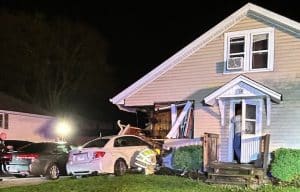COVID survivor lucky to be alive

Over two years after then-president Donald Trump declared a state of emergency relating to the COVID-19 pandemic, some who had become infected with the disease are still in a state of long-term recovery.
One of these individuals is Marine veteran Daniel Morgan, a longtime Waterloo resident.
Morgan contracted the Delta variant in June 2021. Now, over 10 months later – roughly four of which were spent in the hospital – Morgan is “rebuilding (his body) from scratch.”
“I still am unable to work. I’ve not been cleared by my doctor to have a job,” Morgan said. “The lasting effects are chronic joint pain, mostly in large joints like your knees or elbows or shoulders and shortness of breath. Previously in life I ran a lot of marathons, triathlons, I was a Marine, and all these things contributed to giving me a resting heart rate of around 50 – sometimes lower – and after COVID my heart rate was in the 140s.”
Having lost almost 50 pounds, most of which being muscle mass, Morgan likens his body to a “blank slate.”
Morgan and his fiance had planned a weekend trip in June 2021, but Morgan stayed behind due to feeling sick. The doctors said Morgan’s fiance had arrived back in Illinois just in time.
“When she came home, she found me completely delirious. The doctor said that had she spent another day away, she would have come home to a cold, stiff body,” Morgan said.
Having been so early into the days of Delta, Morgan’s admittance signaled a whole new ballgame for the majority of staff at Mercy Hospital South in St. Louis County.
“This was the first time that anybody there had seen it, the severity of it and how quickly it progressed,” Morgan said.
Eventually, Morgan was transferred to Mercy Hospital in Creve Coeur, Mo.
“I had blood infections going on, both lungs were completely full and I was not responding to anything,” Morgan said, adding his right lung later collapsed and his oxygen saturation levels were alarming. “At Mercy Main, I had so many doctors in there all the time. They say I was their ‘miracle ginger.’ Nobody thought I had a chance of survival.”
Throughout his time in the hospital, Morgan was using a ventilator, extracorporeal membrane oxygenation machine – a machine that pumps and oxygenates blood outside the body to relieve the lungs – and was even put into a coma for two months so his body could heal.
“The infectious disease doctor was fabulous. He visited every single day and every single day he was like ‘man you are the sickest person in this entire hospital,’” Morgan said.
To this day, Morgan is still not sure how he contracted the variant. As a trucker, he spent much of his time in solitude on the road.
“We still go back and try to figure out how I got it, where I got it from,” he said. “The only thing we can come up with is from a restaurant here in town, or when I went out to a bar to get a drink.”
Why the disease ravaged his body also remains a mystery. Morgan was not vaccinated at the time he contracted it – now he is fully vaccinated – yet said he did not have any severe underlying conditions.
In fact, pre-COVID Morgan had a clean bill of health. He attributes his survival to a healthy lifestyle.
“Fortunately, I was in such good shape that my body responded favorably to all the treatment, all the pills, the medications, the drugs that the doctors prescribed for me,” he said.
As far as prevention, Morgan said taking care of one’s body is of utmost importance, as well as things he considers “common courtesy.”
“I think it’s a good idea for people to be vaccinated, but I think that’s a personal choice,” Morgan said. “When in large groups, wear a mask. If you’re ill, don’t go to work. It’s just a lot of common courtesy issues, common sense issues. Other countries across the globe have been practicing for years, decades even, that if you have a cold, wear a mask and that’s respected, it’s accepted and that is expected. Here in the states, we’ve never really had that outlook.”
This advice can still be applied today, as BA.2, an Omicron subvariant, is becoming more prevalent in the states. It is shaping up to mimic the severity of the well-known Omicron strain, experts said.






